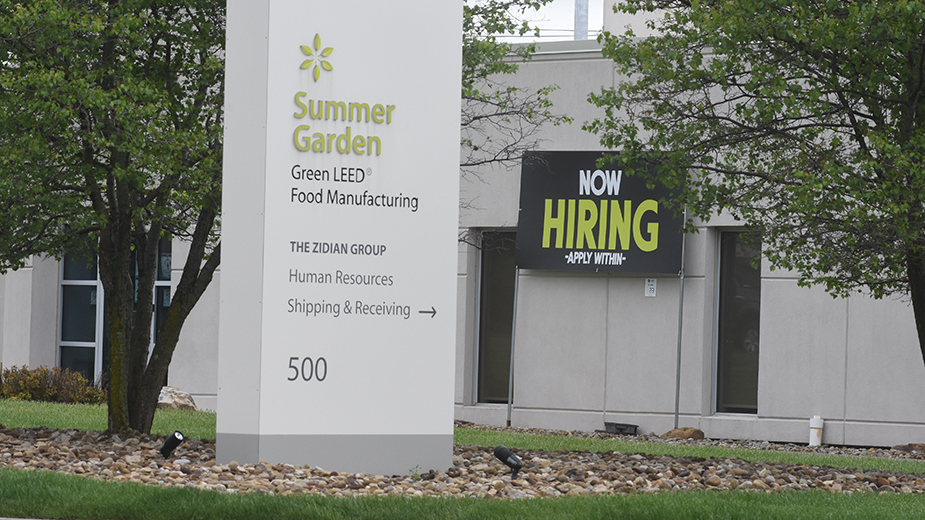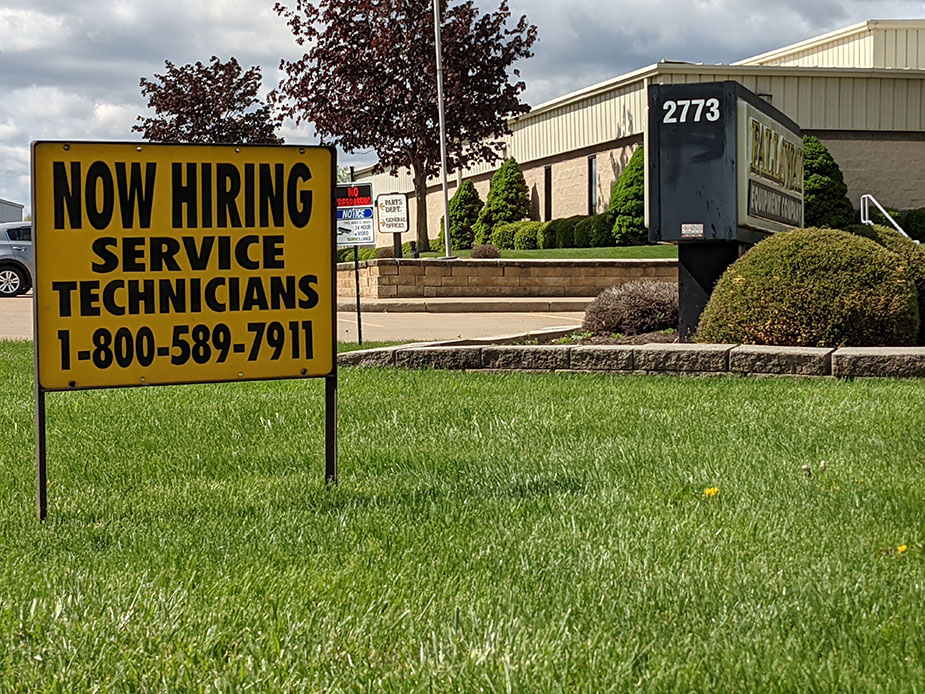YOUNSGTOWN, Ohio – Drive down any business corridor in our region – or the nation, for that matter – and you’ll see signs that read “Now Hiring.” It’s an indication that business is picking up steam once again.
In Boardman, for example, a drive down McClurg Road finds signs aplenty advertising job opportunities. Summer Garden Food Manufacturing announces in bold letters that job seekers can apply within. The company website lists six full-time positions, including warehouse work and a 12-hour production support shift, the latter an entry-level position with no experience required.
But there is no rush of job applicants. As companies ramp up, they are courting talent from a limited pool of applicants, creating a job seekers’ market.
“Everyone is hiring. So there’s more availability for applicants,” says Debbie Smith, human resources coordinator at VentraSalem, a supplier of components for the automotive industry. “They can walk down our industrial park [in Salem] and there’s yard signs in every business [announcing they’re] hiring.”
VentraSalem is looking for a control engineer, industrial maintenance workers, a certified welder and general operators, she says.
The labor shortage isn’t exclusive to any one business sector. In April, the Bureau of Labor Statistics reported there were 7.4 million job openings nationwide in February, the most recent data available.
Health care led with 1.45 million openings, followed by professional and business services with 1.39 million. Industries that saw the highest monthly increases were health care, accommodation and food services, and arts, entertainment and recreation.
In Ohio, as of May 2 there were 181,664 available jobs posted to OhioMeansJobs.com; more than 92,000 paid salaries of at least $50,000.
During a drive around the area, we found ‘Now Hiring’ signs for Fallsway Equipment Co., Astro Shapes LLC, Seeley Medical, Sheet Metal Workers Local 33 and Boardman Local Schools, among others.
Of the top 10 positions posted, six are in health care, followed by hospitality and food service, says Mary Ann Kolchalko, director of the Workforce Development Board of Mahoning and Columbiana Counties.
“It’s like trying to buy a piece of plywood right now,” Kolchalko says. “Everybody wants it and there’s a limit.”
Several factors contribute to that limited workforce. In March, Congress passed the $1.9 trillion American Rescue Plan, putting an additional $300 per week in the pockets of those receiving unemployment compensation.
“You’re not finding the applicants that you used to find because they’re getting more to not go to work,” says VentraSalem’s Smith.
Add to that persisting fears over COVID-19 and, for some, a lack of reliable child care and many would rather stay home than rejoin the workforce, Kolchalko says.
“We know a lot of people have justifiable fears,” she says. “They have comorbidities or someone in their home is sick. So they removed themselves from the workplace.”
Even getting people to apply for good-paying jobs is a challenge.
Hiring is slow at Pennex Aluminum Co. in Leetonia, says the company president, Chuck Stout. The extended unemployment benefits and lingering concerns with COVID-19 make it “very difficult to fill the number of openings we currently have.”
As of the end of the first quarter, the company had received 82 applications for 95 job openings, Stout says. Typically, the company interviews four or five people to fill one position.
“We can’t even get enough applicants to go one-for-one,” he says.
Pennex is trying everything from direct outreach, mailers and road signs to online postings on Indeed and LinkedIn. Applicants can apply in person and potentially get an interview on the spot.
Many manufacturers are training and promoting from within. Ventra Salem’s Smith says operators there can become supervisor trainees, team leaders and truck drivers. The company pays for the training.
“We’ve sent people off the floor from quality inspections to go to HR school to become a human resources professional,” she says.
Andover-based Seeley Medical, which has an office in Poland, is hiring delivery drivers, customer service representatives and a respiratory therapist for its Akron office, says Beth Tomlinson, human resources officer. Seeley promotes jobs on Monster.com. as well as on outdoor signs and at colleges and universities in the area – but with “very little success,” she says.
Not all of the applicants are serious, according to Tomlinson.
Some applicants “attach garbage for a resume, like a blank resume, or a resume with an invalid phone number,” she says.
To attract job applicants, the Workforce Development Board’s Kolchalko suggests rewording online job posts, such as mentioning if a shift aligns with a bus schedule and route. “There are a lot of people who have transportation issues,” she says.
Companies need to be able to pay good wages as well, particularly in retail, says James Sabatini. The co-owner of J. Sabatini Shoes in Calcutta is also a St. Clair Township trustee and Southern Columbiana County Regional Chamber board member.
“People need a little higher income for them to want to come out and work,” he says. “In what we do, if you have a good candidate, you have to make it worth their while to stay.”
There’s also a deep disconnect between the jobs available and the skills some job seekers possess.
According to the “Future of Work 2021 Global Outlook Special Report” published by Monster, a third of U.S. employers say the skills gap has increased and 80% say they have difficulty filling openings because of it.
To help to bridge that gap, organizations such as the Mahoning & Columbiana Training Association and One-Stop can subsidize job retraining for dislocated workers, Kolchalko says.
When restaurant and hospitality workers found themselves unemployed during the pandemic, some pursued retraining for local in-demand jobs that are more stable, particularly driving a truck and licensed practical nursing, she says.
Licensing for some of those jobs did stall during the pandemic, however. “It takes a while to get through your training,” Kolchalko adds. “A lot of those people aren’t even finished yet.”
Connecting companies with training or education providers is one of the first things the Youngstown/Warren Regional Chamber does when working with a company, says Sarah Boyarko, chief operating officer and senior vice president for economic development.
Projects the chamber managed in 2020 look to create 3,203 jobs over the next three years. Some of those positions are included in the 6,699 jobs available in Mahoning, Columbiana and Trumbull counties as of March, she says.
Boyarko believes the workforce in the area can fill those positions. “It’s just a matter of making sure they have the appropriate skills,” she says.
The skills gap is a major concern for health care providers. Mercy Health – Youngstown needs employees in clinical areas and emergency care services, as well as in post-acute and home care, says Arisha Williams, talent acquisition supervisor. The greater need for specialized skills and training is an obstacle when looking for new employees, she says.
There just aren’t enough people coming into the health care field to meet demand, says Joe Shorokey, CEO of Alta Care Group. Hiring at Alta is “grim, at best,” and the ongoing pandemic, as well as the increased use of telehealth has driven demand to surpass available staff, he says.
“I could hire seven or eight people today and so could all of my colleagues,” he says. “It’s an absolute workforce crisis.”
Alta needs licensed counselors, as well as baccalaureate level positions, including case managers, teachers, assistant teachers and teaching aides for Head Start.
Employers across the board are trying new ways to recruit, such as offering more leave time, sign-on bonuses and tuition reimbursement. But it’s a mixed bag on how well it works.
In February, Alta increased starting salaries for clinical counselors and offered greater flexibility with hours, Shorokey says. The organization also offers fee-for-service options for workers interested in earning a higher salary in lieu of some benefits.
“If you don’t do that now, you’re putting yourself behind the eight ball in terms of recruiting a younger workforce,” he says.
When funding is available, student loan repayment assistance is also an option, he notes.
Sign-on bonuses are offered as well but behavioral health organizations find themselves competing with health care providers who can offer larger sums. Sign-on bonuses at Alta can be up to $2,000, while Compass Family and Community Services has offered up to $2,500 for certain positions.
But neither organization can compete with the $5,000 to $10,000 bonuses larger organizations offer.
“We compete in an industry with nursing homes and hospitals,” says Joe Caruso, Compass president and CEO. “As a community nonprofit corporation, it makes it somewhat difficult.”
Like Alta, Compass focuses on the work environment and company culture, Caruso says. Offering different shifts helps employees to maintain a work-life balance, which he says is important in an emotionally taxing industry.
“People come here when life isn’t rosy and grand,” Caruso says. “If we can’t help and work with our Compass family members, how can we be helping those who come through our doors?”
Compass has 14 open positions for licensed workers, as well as part-time therapeutic program workers and youth care workers, he says.
In the next few months, Compass looks to introduce a 401(k) match as another incentive.
Reporter John Vargo contributed to this article.
Pictured: Summer Garden is one of many companies on McClurg Road in Boardman with “Now Hiring” signs.





